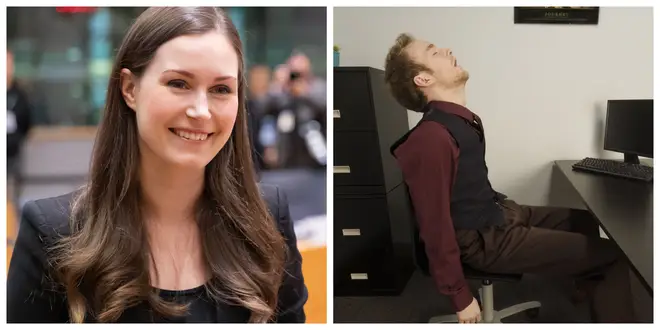
Clive Bull 1am - 4am
6 January 2020, 09:34

Finnish Prime Minister Sanna Marin has said she believes a four-day working week with six-hour days would allow people to enjoy hobbies, culture and spend more time with their families.
She has called for a flexible working schedule in the country to improve the productivity of workers and create greater work-life balance.
In Finland, it is currently normal to work eight hours per day, five days per week.
The suggestion follows in the footsteps of neighbouring Sweden, where the six-hour day has applied since 2015.
Ms Marin says she hopes her proposal will let citizens spend more time with their families and pursue their hobbies.
"I believe people deserve to spend more time with their families, loved ones, hobbies and other aspects of life, such as culture," the Prime Minister told new Europe.
"This could be the next step for us in working life."
The proposal has seen support from politicians in Finland, including the minister of education Li Andersson, the leader of the Left Alliance.
She said: "It is important to allow Finnish citizens to work less. It is not a question of governing with a feminine style but offering help and keeping promises to voters."

The coalition headed up by Ms Marin has demanded a test run for the new schedule to acknowledge the 120th anniversary of the Social Democratic Party in the city of Turku.
Ms Marin also pushed for a shorter working week to improve employee rapport and productivity when she was Minister of Transport.
During her time as Minister of Transport and Communications, she said: “A four-day work week, a six-hour workday. Why couldn’t it be the next step?
"Is eight hours really the ultimate truth?"
She heads up the centre-left coalition which consists of five parties all headed up by women, three of which are under 35.
34-year-old Ms Marin is the second youngest head of government in the world, having assumed office on December 10, 2019.
The idea is also being trialled by some businesses, with Microsoft Japan introducing a four-day week for their employees in November.
Productivity levels rose by 39.9 per cent, the company reports.
New Zealand legal company Perpetual Guardian also made headlines in 2018 for introducing a four-day work week.
Founder Andrew Barnes said: "Our productivity has gone up, our profits have gone up, our staff retention has improved, our stress levels have dropped."
Some experts have also suggest that shorter working weeks will be beneficial to the environment as well as workers.
Philipp Frey, agenda contributor at the World Economic Forum, said: “Our current working time and lifestyle models are deeply intertwined with a fundamentally unsustainable economy.”
He added: “This demands us to endure long commutes due to overpriced housing and eat carbon-intensive, frozen foods since we lack the time to prepare decent quality meals ourselves.”